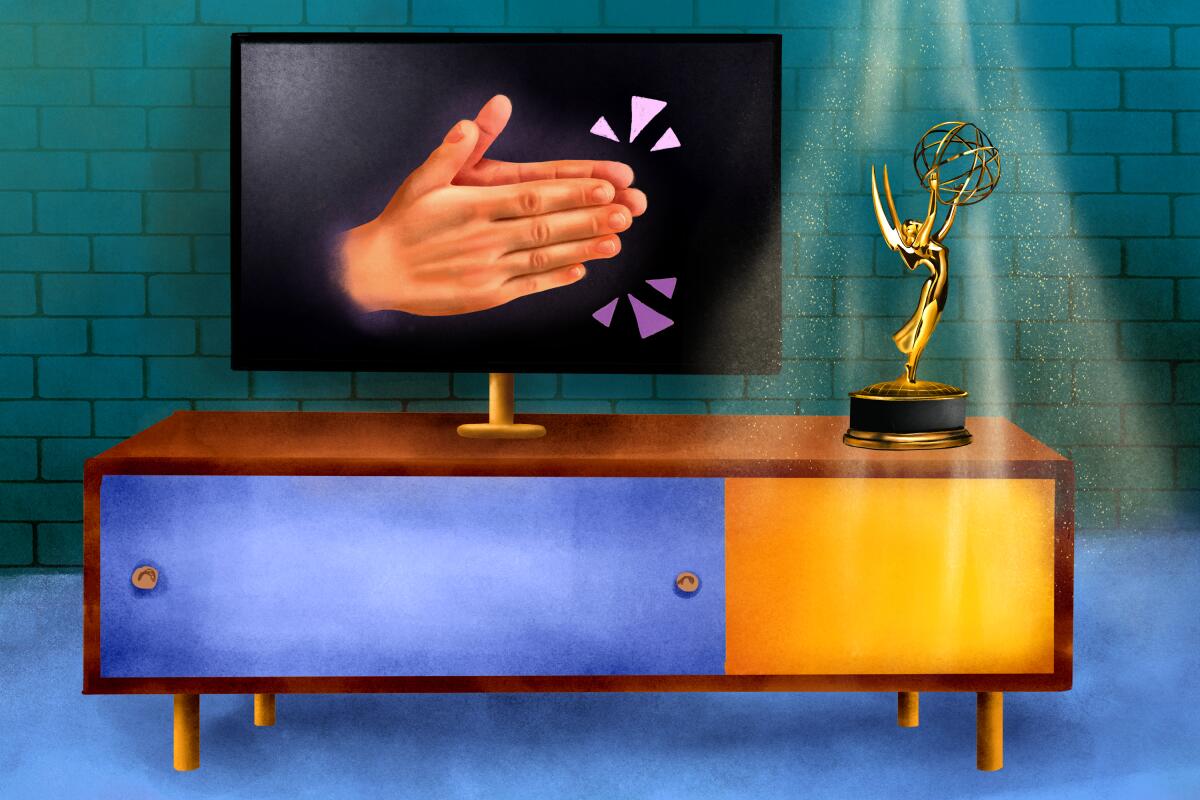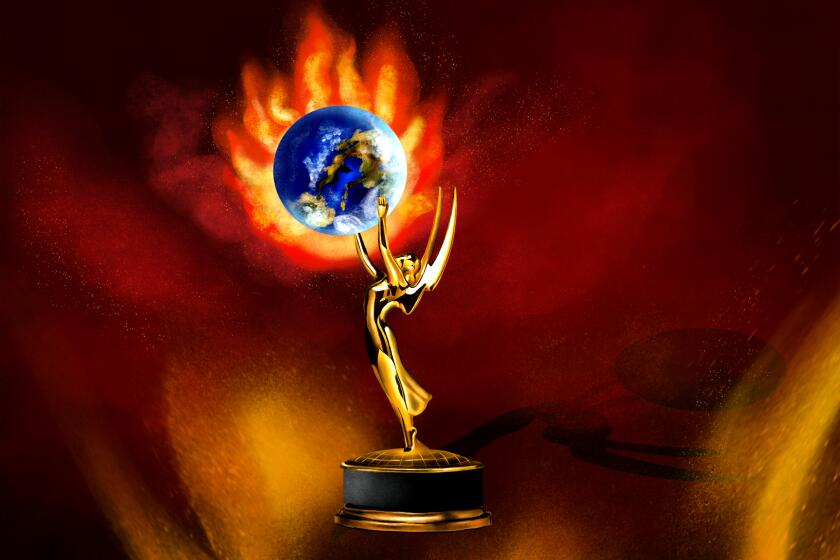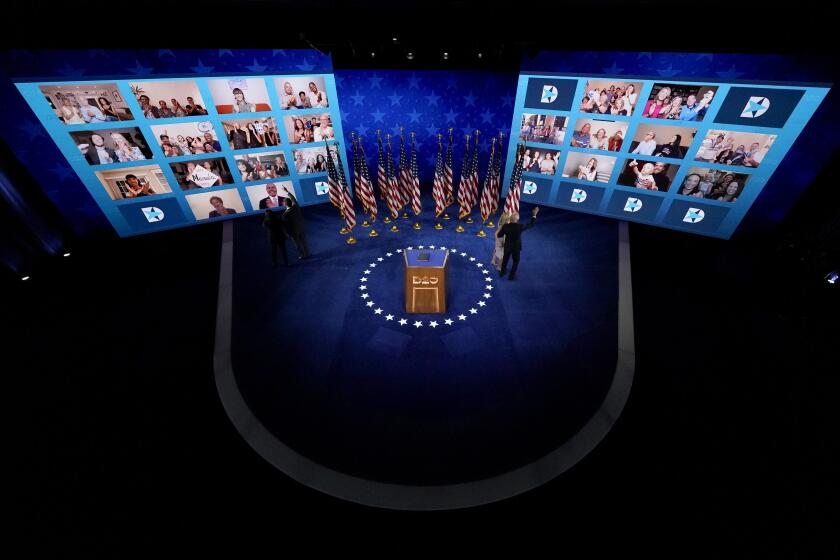TV has made 2020 bearable. The Emmys have never been more important

- Share via
No matter who or what dominates the 72nd Primetime Emmy Awards, there’s already one clear winner rolling up to Sunday’s virtual ceremony.
2020’s top honor — the award for Keeping Us Occupied During the Worst Year Ever — belongs to television itself.
Thank you, television, for soldiering forward with prestige programming, total mindless junk and everything in between while the rest of the planet was forced to shut down and isolate in the face of COVID-19, deadly weather events and one political crisis after the next.
Through environmental catastrophe and social unrest, no one medium has done (or is doing) as much to keep us as entertained, connected, informed and distracted as you have since the sun set on malls, hair salons and leaving one’s own home in March.
You stepped up when cinemas, live concerts, sporting events, museums and theater had to step back, providing comfort for the anxious, stimuli for the stir crazy and babysitting services for parents suddenly faced with homeschooling. I know we complained a mere nine months ago that there was too much to watch, on too many platforms, across too many screens, but please forgive us. What seemed overwhelming in the Before Times is now a godsend.
In the best of times, the Emmys are a harmless, if somewhat absurd, entertainment. 2020 is not the best of times.
If there’s any one time when the entertainment industry deserves to pat itself on the back without looking like a total self-centered jerk, it’s this year’s Emmy Awards.
“We get to celebrate television in a year that it really deserves to be celebrated because television’s gotten us through this year in a lot of ways. It has really been one of the unifiers,” Emmy telecast producer Reginald Hudlin told my colleague Michael Ordoña of this year’s ceremony.
Hudlin is right. From cable and broadcast networks’ round-the-clock programming to the infinite offerings of digital streamers and subscription services, television has saved us from ourselves.
“Tiger King” was ready to pounce in March when “shelter in place” became a household term. It mercifully showed us a world more dysfunctional and perhaps more creepy than our own. See, things could be worse. Too raw? Comfort-food sitcoms like “Friends” and “I Love Lucy” are more accessible than ever thanks to the expanding universe of subscription viewing. Audiences with too much time on their hands finally had the opportunity to catch up on volumes of peak TV, from Emmy nominees like “Succession,” “Better Call Saul” and “Schitt’s Creek” to the bottomless list of must-see shows they missed when it was still safe to step outside.
The virtual Democratic National Convention was designed for the COVID-19 pandemic. It ended up reinventing a fusty tradition — hopefully forever.
With Broadway shuttered and cineplexes closed in much of the nation, TV has made it possible to watch major Hollywood features such as “Mulan” without leaving your living room, and for families locked out of the stage craze due to the steep price of theater tickets to stream “Hamilton” for a fraction of the cost.
Emmys 2020
Television’s done more than just keep the masses entertained. Those of us who’ve wanted to stay engaged amid all the pandemonium have had just as many if not more options. National and cable news outlets continue to cover more, with less access, via Zoom, socially distanced news conferences and masked reporters in the field. Premium docuseries and news shows like HBO’s “The Swamp” and “Axios” tackle racial justice, social unrest, political corruption, economic collapse, climate change calamity and everything else that’s made 2020 such a special year.
TV has the immediacy and improvisational quality that movies lack, which has allowed it to react to and reflect America’s pandemic anxiety and racial strife with stunning speed. In June, Netflix released Dave Chappelle’s unannounced stand-up special, inspired by the injustice of George Floyd’s killing, via the platform’s comedy-branded YouTube channel. Two months later, Hulu suddenly released the formerly shelved “Please, Baby, Please” episode of “black-ish.” The “controversial” episode, which focuses on racism, President Trump and other features of the American political landscape at the moment of its making, was buried by ABC just before its scheduled 2018 air date.
Watching quarantine-era programming react to the world in real time, while experimenting with new formats, has been a spectacle unto itself. “Dancing With the Stars” recently pranced back onto the screen, cha-cha-cha-ing its way through Armageddon. If that wasn’t weird enough, “Tiger King’s” black widow, Carole Baskin, performed the pasodoble on opening night. Next week, the Four Horseman of the Apocalypse attempt the mashed potato. Even the paranormal detectives of Travel Channel’s “Ghost Adventures” produced a quarantine special that was billed as “two horrified weeks quarantined inside Zak Bagans’ Haunted Museum in Las Vegas.”
In a shelved episode just released on Hulu, ‘black-ish’ offers a reminder that the politics of its greatest episodes are never less than relevant.
When scheduled productions were put on hiatus, TV pivoted to fill the void. Pandemic disruption gave birth to intimate, entertaining series starring Selena Gomez and Amy Schumer cooking up dishes and culinary disasters in their home kitchens. The Democratic presidential nominee, former Vice President Joe Biden, learned how to campaign from his basement. Last week, Patti LaBelle and Gladys Knight faced off in a socially distant singing battle on the new Verzuz TV, a webcast competition series created by hip-hop producers Timbaland and Swizz Beatz on Instagram Live.
But the award for most impressive metamorphosis in impossible times has to go to late-night TV and its hosts, including Stephen Colbert, Samantha Bee and Trevor Noah. They all of a sudden found themselves broadcasting from their home offices and backyards, minus an audience and pre-COVID-19 grooming. Yet they still managed to skewer the news, and Washington, with eviscerating accuracy.
The industry’s ongoing push to diversify, and its sprint to create content for increasingly hungry “niche” audiences, has also resulted in a wealth of programming that feels made for the moment — not least HBO’s limited series “Watchmen,” this year’s most-nominated program, which confronts the history of systemic racism and police brutality through a sci-fi lens.
Ramy Youssef and Mahershala Ali discuss Season 2 of Hulu series “Ramy” and Hollywood’s long neglect of Muslim stories and characters.
Now it’s the Emmys’ turn to transform a formerly in-person event into a compelling virtual celebration. The ceremony will be hosted by Jimmy Kimmel from Staples Center in Los Angeles and broadcast virtually from the homes of nominees across the country and around the world when it airs Sunday night on ABC.
It’s not the first big celebration to go small. The BET Awards were excellent. The Democratic and Republican conventions both succeeded, to varying degrees, in pulling off the impossible. But no matter what flubs or glitches await, the Emmys and the medium it honors have never been more relevant.
Just as radio provided an escape during the Great Depression, Hollywood tapped its way across the silver screen during World War II and music became a mouthpiece for social revolution in the 1960s and ’70s, television pivoted from a passive form of entertainment to a powerful expression and reflection of our time.
Television is hardly a first responder, but it has been on the frontlines of the pandemic, fighting to keep us afloat. And the Emmys are a small way to say thank you.
More to Read
The complete guide to home viewing
Get Screen Gab for everything about the TV shows and streaming movies everyone’s talking about.
You may occasionally receive promotional content from the Los Angeles Times.









